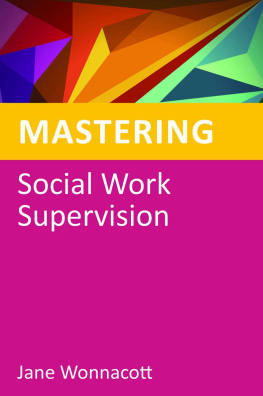Effective Supervision in Social Work
Effective Supervision in Social Work
KATE HOWE
IVAN GRAY
Series Editor: Keith Brown
Learning Matters
An imprint of SAGE Publications Ltd
1 Olivers Yard
55 City Road
London EC1Y 1SP
SAGE Publications Inc.
2455 Teller Road
Thousand Oaks, California 91320
SAGE Publications India Pvt Ltd
B 1/I 1 Mohan Cooperative Industrial Area
Mathura Road
New Delhi 110 044
SAGE Publications Asia-Pacific Pte Ltd
3 Church Street
#10-04 Samsung Hub
Singapore 049483
Editor: Luke Block
Development editor: Lauren Simpson
Production controller: Chris Marke
Project management: Swales & Willis Ltd, Exeter, Devon
Marketing manager: Tamara Navaratnam
Cover design: Wendy Scott
Typeset by: Swales & Willis Ltd, Exeter, Devon
Printed by: MPG Books Group, Bodmin, Cornwall
2013 Kate Howe and Ivan Gray
First published 2013
Apart from any fair dealing for the purposes of research or private study, or criticism or review, as permitted under the Copyright, Design and Patents Act, 1988, this publication may be reproduced, stored or transmitted in any form, or by any means, only with the prior permission in writing of the publishers, or in the case of reprographic reproduction, in accordance with the terms of licences issued by the Copyright Licensing Agency. Enquiries concerning reproduction outside these terms should be sent to the publishers.
Library of Congress Control Number: 2012946927
British Library Cataloguing in Publication Data
A catalogue record for this book is available from the British Library
ISBN 978 1 44626 654 0
ISBN 978 1 44626 655 7 (pbk)
Contents
List of figures
List of tables
List of activities
Foreword
The social work profession has seen unprecedented public and media interest in recent years due, in part, to some well-publicised failings within the care system. However, what is often not reported are the countless stories of excellent practice, where social work professionals make a real and valuable contribution to the lives of vulnerable citizens.
This is not only a frequently thankless task but often an emotionally draining one, which demands great personal resource and commitment from the professional.
High quality supervision is key to supporting these front-line practitioners in order to help prevent burnout, to support reflective practice and to help professional development. Kate Howe and Ivan Gray have written this text as part of the Sage/Learning Matters leadership and management series in order to stimulate and support the best possible levels of supervision within the caring professions.
It is packed full of advice, information and guidance for all potential and active supervisors to help them reflect on, and develop, their supervision of the staff they supervise. This text forms the basis of our supervision and leadership unit here at the Centre for Post-Qualifying Social Work but will be of value to all engaged in this area of study or development, and I warmly commend it to all social work practitioners.
As always, the texts in this series are written to promote and support the best possible social work practice, with the aim that the users and carers of social work and care services receive the best possible support and service.
Professor Keith Brown
Director of the Centre for Post-Qualifying Social Work
Bournemouth University
About the authors
Kate Howe is a a senior lecturer in social work at Bournemouth University. She is a qualified social worker and has supervised and managed teams in the statutory and voluntary sector. Her research interests include conflict management and developing good leadership skills.
Ivan Gray holds academic and professional qualifications in social work and management and specialises in management development. Before his retirement this summer, he was programme leader for the BA in Health and Social Care Management and MA in Leading and Developing Services at Bournemouth University.
Introduction
Supervision is the cornerstone of good social work practice and should be seen to operate effectively at all levels of the organisation (Laming, 2003: 12).
The importance of supervision in good quality professional social work practice is very well accepted. Munro (2011a), the Social Work Reform Board (SWRB) (SWRB, 2011), and Skills for Care (2012a) have all confirmed its criticality and value. Its role in social work is quite unique in the caring services in that it usually combines management with professional supervision. Usually it is seen as central to service delivery; it is the lynchpin of good practice and practice development as well as being the way to monitor and ensure adherence to organisational policy and manage organisational performance and service quality.
Aims of the book
We have written this book because we believe that effective supervision is a complex and demanding activity requiring commitment and a high level of skill and knowledge. The current initiatives to improve the quality of supervision such as the Reform Board standards are crucial to the future of the profession, but they will not be successful on their own. For genuine progress to be made there needs to be changes made at many different levels. Training supervisors is important, but needs to be set in a context of organisational policies that support good practice. Empowering and upskilling individual supervisors will make a difference to the quality of supervision only as long as they are supported to prioritise this crucial part of their workload in a workplace that has stretched resources and increasing pressures.
We therefore aim to consider all aspects of supervision, including the personal effectiveness of the individual supervisor, the dynamics of the supervisory relationship and the organisational issues of implementing good supervision policies.
We also recognise that there is no single model of effective supervision, or any easy answers. Rather there are a range of perspectives from different traditions that might prove useful in helping a supervisor develop their practice. We aim to examine a number of these, taken from a variety of subject areas such as leadership and management theory, professional skills and knowledge, counselling and communications theory, in relationship to supervisory practice.
We will try and do justice to this complexity and accept that often what we are offering is tentative, inviting supervisors to consider perspectives and issues rather than offering them as proven. This is perhaps the essence of the book; it invites supervisors to engage in developing their own personal practice and ultimately it will be their response to this challenge that will determine the success or failure of current initiatives. Supervision has not been well researched, and without an evidence base sustained improvement will be dependent on this engagement and also on action learning and experimentation by supervisors to develop their practice and the organisation. Our aim and hope is that the particular approach of this book might make a small contribution to improvement initiatives, helping tip the balance towards good quality supervisory practice.










